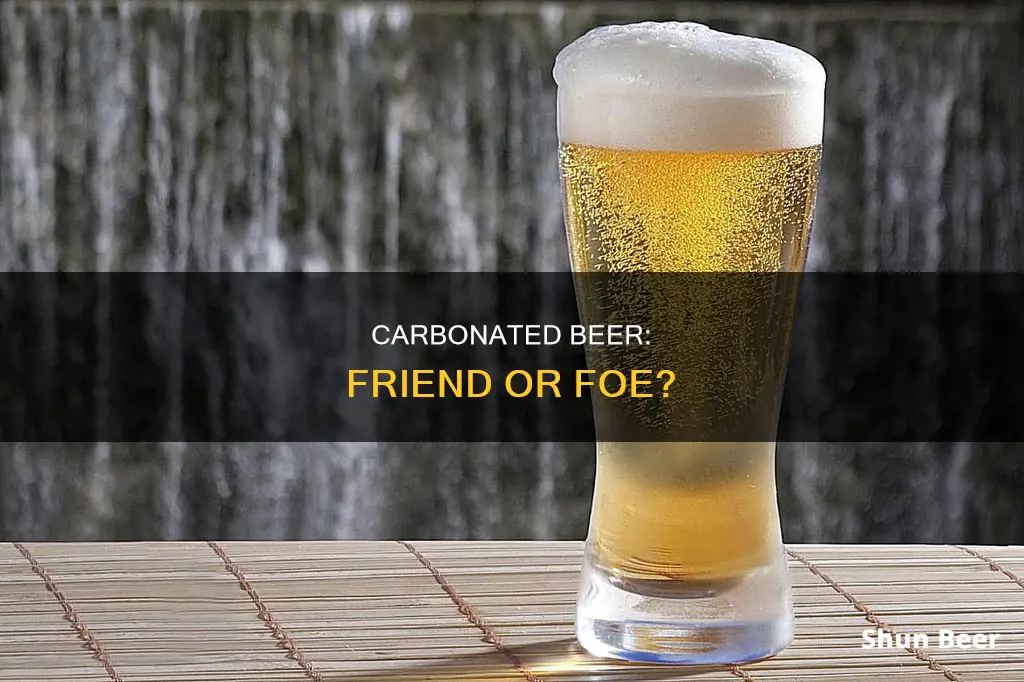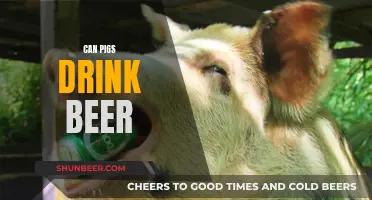
Beer is a beloved beverage worldwide, known for its refreshing taste and effervescent bubbles. But is it healthy to drink carbonated beer? Carbonation is an essential process in beer-making, giving it a distinct mouthfeel and enhancing its flavour. Carbonation occurs when carbon dioxide gas is dissolved in a liquid, creating the familiar bubbles found in many beverages. While carbonated beer is indeed iconic, the process of carbonation can also affect the nutritional value and health benefits of the drink. So, should you drink carbonated beer? Let's explore the topic further.
What You'll Learn

Carbonation enhances the flavour and mouthfeel of beer
Carbonation is essential to the taste and mouthfeel of beer. The process of dissolving carbon dioxide (CO2) gas into a liquid creates the familiar bubbles found in many beverages, including beer. This occurs when CO2 is pressurised and dissolved into a liquid, forming carbonic acid. When the pressure is released, the CO2 escapes in the form of bubbles, giving the drink its tangy taste and fizz.
The tiny CO2 bubbles in beer enhance the drink's aroma and provide a pleasant tingling sensation on the palate, making the beverage feel more refreshing and lively. Carbonation levels vary widely across different beers, influenced by factors like style and brewing methods, making each type unique.
Highly carbonated beers, such as German wheat beers, are known for their effervescence. The higher levels of carbon dioxide give these beers a refreshing zing, enhancing their flavour and aroma. When poured into a glass, these beers produce a lively head of foam that sticks around, making every sip a delightful experience.
On the other hand, lightly carbonated beers, such as British ales, have a gentler fizz, resulting in a smoother mouthfeel. The lower carbonation levels allow the malt and hops flavours to shine through without being overwhelmed by bubbles. This creates a more relaxed drinking experience, perfect for savouring the brew's unique flavours.
Carbonation plays a crucial role in enhancing the flavour and mouthfeel of beer. It intensifies the desired flavour and makes each sip more enjoyable, contributing to the overall appeal and refreshment of the beverage.
Beer and Heart Attacks: What's the Connection?
You may want to see also

Carbonation is the process of dissolving carbon dioxide into a liquid
Carbonation occurs naturally when yeast ferments dissolved sugars sealed in a pressure-tolerant bottle or keg. It can also occur naturally when underground volcanic carbon dioxide carbonates well water, or when rainwater passes through limestone into a cave and forms a stalactite. Carbonation can also be done artificially by dissolving carbon dioxide under pressure into the liquid.
The term carbonation is sometimes used interchangeably with carboxylation, which refers to the formation of carboxylic acids. In chemistry, carbonation is often used to describe the formation of carbonates and bicarbonates, as well as carbonic acid. Carbonation is a chemical reaction, and the process of forming carbonates is sometimes referred to as carbonation, although this term usually describes the process of dissolving carbon dioxide in water.
In beer, carbonation is essential to the mouthfeel and contributes to its refreshing aspect. All beer leaves the brewer carbonated, either through natural or forced carbonation. In both cases, beer and carbon dioxide are sealed in a container under pressure, allowing the beer to absorb the carbon dioxide and become fizzy. To maintain carbonation, beer must be fully sealed with a tight bottle cap, ensuring that no carbon dioxide escapes until the bottle is opened. Once opened, beer should be consumed within a few hours, as the carbonation will be lost, and the taste will change.
Drinking Non-Alcoholic Beer While on Plavix: Is It Safe?
You may want to see also

Beer must be fully sealed to maintain carbonation
Beer must be fully sealed with a
Beer Consumption for Octogenarians: How Much is Safe?
You may want to see also

Natural carbonation occurs during the fermentation process
Carbonation is the process of infusing carbon dioxide gas into a liquid. In the case of beer, carbonation gives the beverage its distinct refreshing quality and mouthfeel. Beer can be carbonated in two ways: natural and forced carbonation.
Another method of natural carbonation is through bottling. In this case, the beer is allowed to complete fermentation, leaving active yeast suspended in it. A small amount of sugar is added at bottling time, and once the bottles are sealed, the yeast begins to act on the sugar, releasing carbon dioxide that is absorbed by the beer.
Natural carbonation can also be achieved through processes like keg conditioning, bottle conditioning, and spunding. Spunding involves carefully monitoring the present gravity and sealing off the tank after the initial aggressive stages of fermentation. A spunding valve is used to control the pressure and prevent it from exceeding the safe limitations of the tank. This technique creates smaller bubbles, a finer head on the beer, and a softer, more rounded taste.
Brewers may opt for natural carbonation to speed up production, maintain a natural process, achieve a certain mouthfeel, or reduce costs associated with purchasing carbon dioxide gas.
Beer and Atkins: What You Need to Know
You may want to see also

Artificial carbonation is done through forced carbonation
Carbonated beers are definitely enjoyable, and the carbonation process is what gives beer its distinct refreshing fizz and mouthfeel. This process can occur naturally or through You may want to see also Carbonation is the process of dissolving carbon dioxide (CO2) gas into a liquid, creating bubbles. Carbonation is essential in transforming a beer into a refreshing and enjoyable beverage. The bubbles enhance the aroma, flavour, and mouthfeel of the beer. Beer can be carbonated in two ways: natural and forced carbonation. Natural carbonation occurs during the fermentation process, while forced carbonation involves adding CO2 directly to the beer.Winter Drinking: Beer or Liquor?
Frequently asked questions







